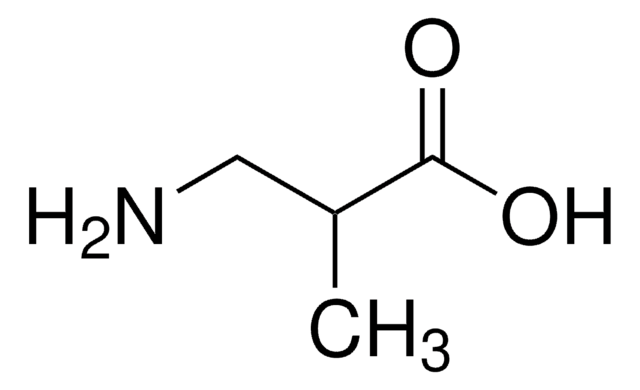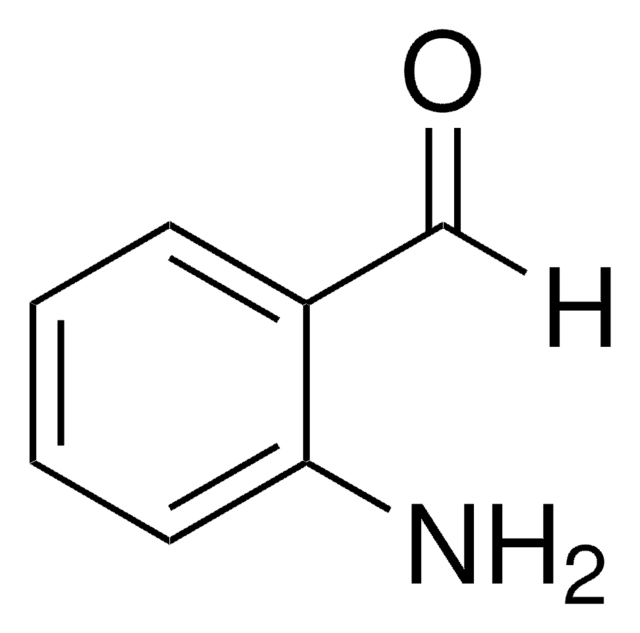162663
DL-2-Aminobutyric acid
99%, for peptide synthesis, ReagentPlus®
Synonym(s):
AABA, Homoalanine, alpha-amino-n-butyric acid
Sign Into View Organizational & Contract Pricing
All Photos(1)
About This Item
Linear Formula:
C2H5CH(NH2)CO2H
CAS Number:
Molecular Weight:
103.12
Beilstein:
635889
EC Number:
MDL number:
UNSPSC Code:
12352116
PubChem Substance ID:
NACRES:
NA.22
Recommended Products
product name
DL-2-Aminobutyric acid, ReagentPlus®, 99%
Quality Level
product line
ReagentPlus®
Assay
99%
form
solid
reaction suitability
reaction type: solution phase peptide synthesis
mp
291 °C (dec.) (lit.)
application(s)
peptide synthesis
SMILES string
CCC(N)C(O)=O
InChI
1S/C4H9NO2/c1-2-3(5)4(6)7/h3H,2,5H2,1H3,(H,6,7)
InChI key
QWCKQJZIFLGMSD-UHFFFAOYSA-N
Looking for similar products? Visit Product Comparison Guide
General description
DL-2-Aminobutyric acid also known as α-aminobutyric acid, is commonly used in solution-phase peptide synthesis.
Application
DL-2-Aminobutyric acid can be used to synthesize 2-(2,5-dioxopyrrolidin-1-yl) butanoic acid.
Legal Information
ReagentPlus is a registered trademark of Merck KGaA, Darmstadt, Germany
Storage Class Code
11 - Combustible Solids
WGK
WGK 3
Flash Point(F)
Not applicable
Flash Point(C)
Not applicable
Personal Protective Equipment
dust mask type N95 (US), Eyeshields, Gloves
Choose from one of the most recent versions:
Already Own This Product?
Find documentation for the products that you have recently purchased in the Document Library.
Customers Also Viewed
Design, synthesis, and anticonvulsant activity of new hybrid compounds derived from 2-(2, 5-dioxopyrrolidin-1-yl) propanamides and 2-(2, 5-dioxopyrrolidin-1-yl) butanamides
Journal of Medicinal Chemistry, 58, 5274-5286 (2015)
Ryan J Martinie et al.
Journal of the American Chemical Society, 137(21), 6912-6919 (2015-05-13)
The iron(II)- and 2-(oxo)glutarate-dependent (Fe/2OG) oxygenases catalyze an array of challenging transformations, but how individual members of the enzyme family direct different outcomes is poorly understood. The Fe/2OG halogenase, SyrB2, chlorinates C4 of its native substrate, l-threonine appended to the
Fatemeh Mahmoodani et al.
Journal of food science and technology, 51(9), 1847-1856 (2014-09-06)
Skin and bone gelatins of pangasius catfish (Pangasius sutchi) were hydrolyzed with alcalase to isolate Angiotensin Converting Enzyme (ACE) inhibitory peptides. Samples with the highest degree of hydrolysis (DH) were separated into different fractions with molecular weight cut-off (MWCO) sizes
Francesco Gasparrini et al.
Journal of the American Chemical Society, 130(2), 522-534 (2007-12-22)
The structure, stability, and reactivity of proton-bound diastereomeric [M x H x A]+ complexes between some amino acid derivatives (A) and several chiral tetra-amide macrocycles (M) have been investigated in the gas phase by ESI-FT-ICR and ESI-ITMS-CID mass spectrometry. The
Cornelia Reimmann et al.
Journal of bacteriology, 186(19), 6367-6373 (2004-09-18)
In Pseudomonas aeruginosa, the antibiotic dihydroaeruginoate (Dha) and the siderophore pyochelin are produced from salicylate and cysteine by a thiotemplate mechanism involving the peptide synthetases PchE and PchF. A thioesterase encoded by the pchC gene was found to be necessary
Our team of scientists has experience in all areas of research including Life Science, Material Science, Chemical Synthesis, Chromatography, Analytical and many others.
Contact Technical Service












